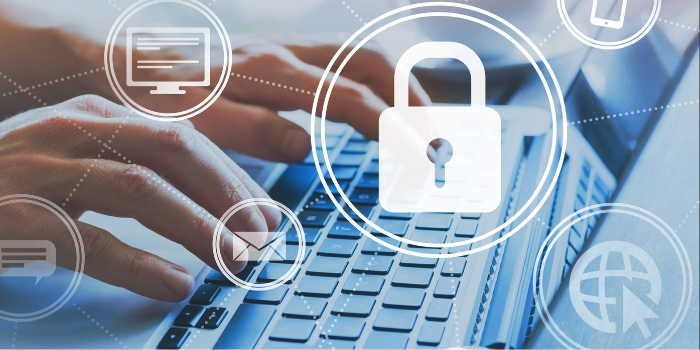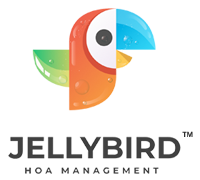Living in a digital world, we conduct a lot of business online, including for our HOAs. Whether you have a community website, allow homeowners to pay assessments virtually, or use social media, keeping your association digitally safe is important. Cybersecurity is vital in preventing liability issues and overall protecting yourself, the board, and the entire association. Join us below for a helpful guide to keep your HOA’s data safe and secure!
Be Aware of Your Virtual Surroundings
Vigilance and awareness are an essential starting point for cybersecurity. Taking preventive measures can be crucial in avoiding sticky situations and protecting your important data.
A good practice is to be vigilant of incoming emails and any attachments, avoiding opening email attachments, or clicking on links from unfamiliar or suspicious senders. Also, it’s vital to be reluctant in downloading and installing unsolicited or unknown applications, as they could be harmful to your device.
When using devices that can access HOA data, being careful on public Wi-Fi and looking out for “shoulder surfing” are crucial practices. It’s a good habit to assume that someone is always watching and to behave accordingly by keeping distance between you and others in order to protect sensitive data.
Furthermore, identifying scam techniques is helpful in preventing data compromise. If you receive an email urgently requesting money or personal information, it’s probably safe to assume something suspicious is going on and to flag that communication as spam. Overall, developing an awareness of the importance of data security and how to prevent the wrongful dissemination of information is vital in safeguarding your community.
Make Proper Training a Priority
Another important factor in your cybersecurity defense should be educating users who will be handling association information. End-user training is important because humans are the last line of defense in making sure data remains secure. So, anyone handling your association information should be required to pass security awareness training. Our partners at Boardline Academy have created great training material for association professionals, which includes data security.
Also, HOA employees and volunteers who handle digital data should be given frequent reminders on cybersecurity best practices and what phishing attacks look like. Consistently refreshing these topics will help build important habits in protecting your HOA’s data, ensuring information stays safe and secure.
Utilize Multiple, Layered Systems
In addition to raising awareness and training users, employing various systems that complement each other will effectively safeguard your association.
- Encrypting your HOA’s data makes it difficult for non-authorized users to access. Data protection software like Sophos helps further protect your association’s information.
- In addition to encrypting your data, it’s important to ensure the safety of your information using passwords or other protection methods. Single sign-on (SSO) systems, such as Microsoft SSO and OKTA, create randomized passwords for each program or website. Additionally, two-factor authentication along with using strong, varied passwords that are long and complicated by combining capital and lowercase letters with numbers and symbols protect your data. Also, locking mobile devices with a passcode or some sort of ID protection further limits the access of your HOA’s information.
- Protect your data with secure cloud-based systems as well. Utilizing a separate off-site service to host data further secures your information. Also, cloud-based hosting of your data, such as OneDrive for Business or SharePoint, assists in emergency recovery.
- Making sure data is only accessed with secure connections is vital in the protection of your information. Utilizing a cellular connection or virtual private network (VPN) in public helps limit non-authorized user access. Additionally, a cloud-based network can help monitor traffic and ensure information remains secure.
- Another system of defense is to make sure that all your software is updated so it can function at the highest level possible and offer the most amount of safety protection. This includes any anti-malware and data protection software.
Implement Standard Policies
By establishing and abiding by best practices, your association’s data can remain safe and secure. Having data loss prevention policies and emergency plans can also help in case physical or digital disaster strikes. Following policies and maintaining strict limitations on who can access data will ensure that your HOA’s information is always in the right hands and remains safe in case of an emergency. Additionally, having data access management protocols for social media is important.
Conducting secure backups is another solid policy to implement. Also, engaging in user-level monitoring as needed can be helpful in pinpointing where something might have gone wrong. By frequently reviewing back-up systems to make sure they’re functioning properly, and that data is backed up correctly, your data can remain safe and secure. A cyber insurance policy is another great way to ensure your information is protected in case of emergency.
Partner with a Management and/or IT Company
Having a reputable management or IT company help you handle your digital data is a smart move. However, make sure that your partners have good security etiquette and practices in place and can offer extensive protection services. A confident and informed management company can help ensure your information is safe. Additionally, it could be helpful to hire IT to review current procedures and security to recommend any improvements.
If you have any questions about managing your association’s digital information or are interested in what cybersecurity we can offer, reach out to a JellyBird representative today!

